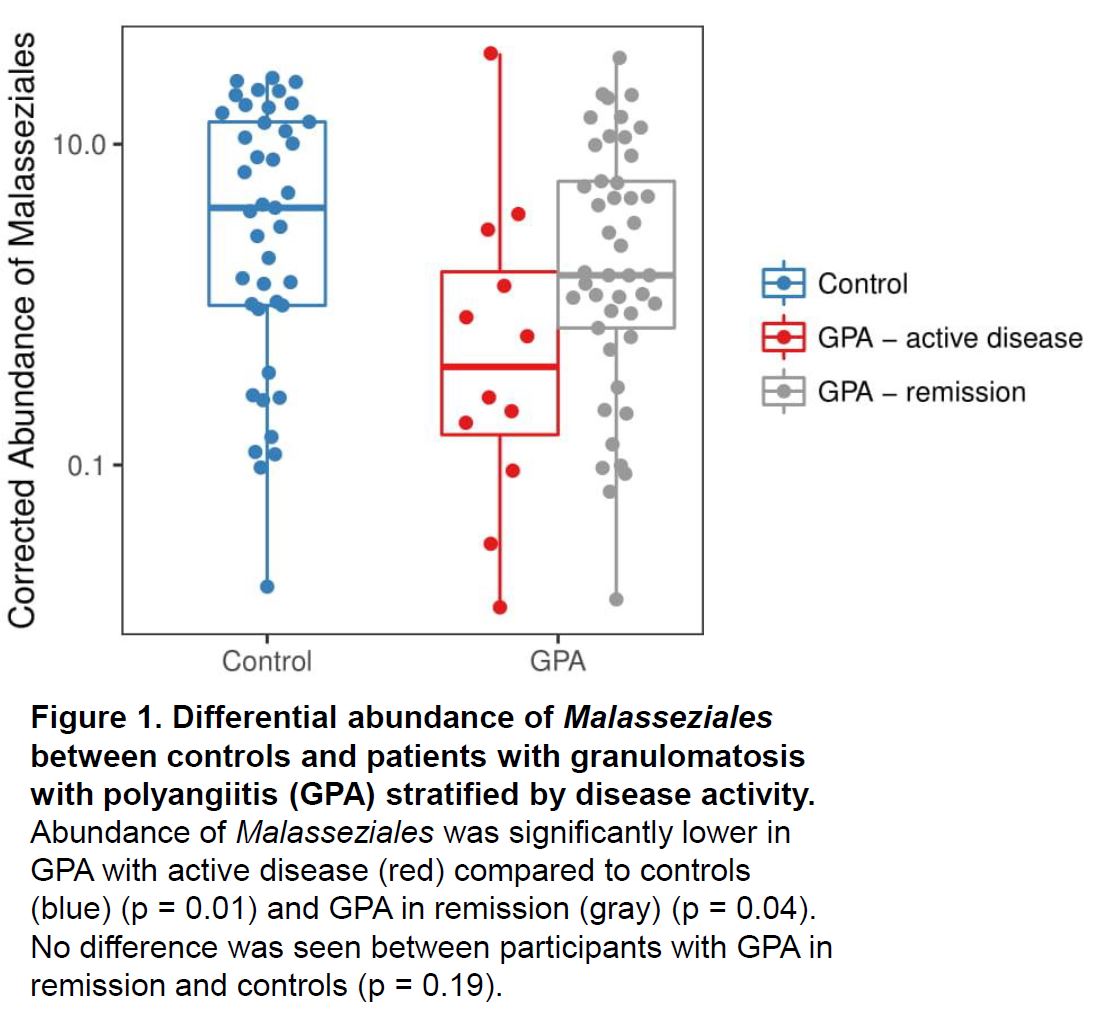Session Information
Session Type: ACR Poster Session B
Session Time: 9:00AM-11:00AM
Background/Purpose:
While prior studies have demonstrated that granulomatosis with polyangiitis (GPA; Wegener’s) is associated with an altered composition of nasal bacteria and that use of an antibiotic may reduce the risk of relapse, no studies have evaluated the role of nasal fungi in GPA. It has been suggested that fungi may stabilize bacterial communities and interact with the immune system. Using deep sequencing methods, this study evaluated the composition of nasal fungi in GPA compared to healthy controls and examined interactions between nasal fungi and bacteria.
Methods:
Fungal internal transcribed spacer (ITS) and bacterial 16S rRNA gene sequencing were performed on DNA isolated from nasal swabs of 60 participants with GPA and 41 healthy controls. Main results of bacterial DNA sequencing were previously reported. Total fungal content was determined by PicoGreen-quantification. Using Wilcoxon rank sum test and generalized linear models, the abundance of total fungi and the most abundant fungal taxa (Malasseziales) were compared in GPA vs controls as well as within GPA subgroups: disease activity according to the BVAS/WG, ANCA type, sinonasal damage, and use of medications (immunosuppressants and antibiotics). Correlation in the abundance of fungi and bacteria were assessed using Spearman’s correlation coefficient.
Results:
Malasseziales was the most abundant fungal taxa present followed by the genera Penicillium and Aspergillus. There was a non-significant trend towards lower abundance of total fungi in GPA vs controls (p = 0.06). When evaluating the most abundant taxa Malasseziales, we found a significantly lower abundance of Malasseziales in GPA vs controls (p = 0.04) and this difference was most pronounced in the group with active GPA which had a significantly lower abundance compared to GPA in remission (p = 0.04) and healthy controls (p = 0.01)(Figure 1). No associations were found among the other co-variates. There was significant positive correlation in the 5 most common bacterial species present in the samples and abundance of total fungi (Figure 2) as well as abundance of Malasseziales (data not shown).
Conclusion:
The abundance of Malasseziales is significantly lower in the nasal mucosa of GPA vs controls and is associated with disease activity in GPA. Co-variation in the abundance of fungi and several bacterial species suggests fungi and bacteria may interact in the nose. These results support the possibility that commensal fungal communities and their interactions with bacteria may be involved in disease pathogenesis of GPA.
To cite this abstract in AMA style:
Rhee RL, Sreih AG, Najem CE, Grayson PC, Zhao C, Bittinger K, Collman R, Merkel PA. Fungal Composition of the Nasal Mucosa in Patients with Granulomatosis with Polyangiitis [abstract]. Arthritis Rheumatol. 2018; 70 (suppl 9). https://acrabstracts.org/abstract/fungal-composition-of-the-nasal-mucosa-in-patients-with-granulomatosis-with-polyangiitis/. Accessed .« Back to 2018 ACR/ARHP Annual Meeting
ACR Meeting Abstracts - https://acrabstracts.org/abstract/fungal-composition-of-the-nasal-mucosa-in-patients-with-granulomatosis-with-polyangiitis/


